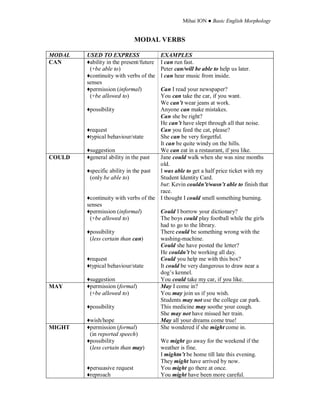This document provides an overview of different modal verbs in English and their uses and meanings. It lists the main modal verbs - can, could, may, might, must, shall, should, ought to, need, will, would, used to, be to, dare - and describes their typical uses to express ability, possibility, permission, probability, prediction, obligation, volition. It also includes a modal verb chart and a section explaining degrees of certainty expressed by different modal verbs.

![Mihai ION ● Basic English Morphology
MUST ♦internal/specific obligation
(neg. with have to)
♦external/habitual obligation
(only have to)
♦necessity
(+have to)
♦prohibition
♦probability/deduction
♦strong advice
♦reproach
You must wash the car tomorrow.
You don’t have to wash the car tomorrow.
Nurses have to wear a uniform.
I must study hard to pass the exam.
She had to stay in bed to recover.
We’ll have to work long hours to get a rise.
Visitors must not feed the animals.
You must be hungry after your long walk.
She must be having a lot of problems with the
language.
He must have known what she wanted.
You must read this book – it’s brilliant!
Must you make so much noise?
NEED
(int. & neg.)
♦(lack of) necessity Need I buy this paper? (I hope not.) [specific]
Do I need to buy it every morning? [habitual]
We needn’t go to work tomorrow.
We don’t need to go to work at weekends.
You needn’t have waited for me.
[action performed]
I didn’t need to wait very long for the bus.
[action NOT performed]
SHALL ♦prediction
♦willingness/determination
(formal)
♦offer/suggestion
(only int.)
♦order/instruction (formal)
♦promise/threat
This time next week I shall be on holiday.
You shall stay with us as long as you like.
You shall obey my orders.
Shall I fetch you a glass of wine?
What shall we do this weekend?
Candidates shall remain in their seats until all
the papers have been collected.
If you eat up your lunch, you shall have ice-
cream for dessert.
Your brother shall pay dearly for it!
SHOULD
OUGHT TO
♦mild obligation/advice
♦probability/deduction
(less certain than must)
♦surprise (only should)
♦offer/suggestion
(only should – AmE)
♦hypothesis (only should)
(after if and in case)
You should/ought to give up smoking.
He should/ought to have been more careful.
The children shouldn’t/oughtn’t to watch so
much television.
They should/ought to be home by now.
Who should come in but his ex-wife!
Should I make the coffee?
Should we meet outside the theater?
Let me know if you should change your mind.
Take the umbrella in case it should rain.
WILL ♦prediction This will make you a fortune.
How long will you be staying in Paris?
Oil will float on water. [generic]
Engines won’t run without lubricants.
This will be your sister, I suppose. [probable]
They will have reached Dublin by now.
She will surf the Internet for hours. [habit]](https://image.slidesharecdn.com/5modalverbs-140504034826-phpapp02/85/English-modal-verbs-2-320.jpg)
![Mihai ION ● Basic English Morphology
♦willingness (weak volition)
♦intention (neutral volition)
♦insistence (strong volition)
♦request
♦offer/invitation
♦order/instruction (internal)
I shall be glad if you will do this.
The door won’t open! [refusal]
‘I’m thirsty.’ ‘I’ll buy you a diet coke.’
I will go to the party, whatever you may say.
[determination]
He will comb his hair at the table, even if he
knows I don’t like it. [annoyance]
Will you water the plants while I’m away?
Will you have another sandwich?
You will do it this minute!
WOULD ♦prediction
♦willingness (weak volition)
♦intention (neutral volition)
♦insistence (strong volition)
♦request (more polite)
♦offer/invitation
I was sure he would receive my letter.
That would be her aunt Nelly. [probable]
When my parents were away, my neighbour
would look after me. [past habit]
I should be glad if you would do this.
My car wouldn’t start this morning. [refusal]
I said I would buy her a diet coke.
He would keep fighting, although he was
bleeding heavily.
Would you open the door for me, please?
Would you have dinner with me tonight?
USED TO ♦past habit I used to collect stamps when I was a child.
BE TO ♦order/instruction (external)
♦arrangement
♦impossibility (only neg.)
We were to be back by Friday.
They are to be married in July.
The book was not to be found.
DARE
(int. & neg.)
♦courage
♦indignation
♦probability (only aff.)
(+say)
I daren’t ask my boss for a day off.
Churchill dared not go against the Americans.
How dare you call me a liar?
I dare say you are British, but you still need a
passport to prove it.
MODALITY CHART
ability possibility permission probability prediction obligation volition
can
could
can
could
may
might
can
could
may (fml)
might
must
should
ought to
will
shall (fml)
would
must
shall (fml)
will
be to
should
ought to
need
will
would
shall
Degrees of certainty
The key will be in your pocket. You always keep it there. [prediction, certainty]
The key must/can’t be in your pocket. I know you (didn’t) put it there. [deduction, certainty]
The key should/ought to be in your pocket. I would expect it to be there. [probability]
The key could be in your pocket. It is possible but not probable. [strong possibility]
The key may be in your pocket. Perhaps it is there. [neutral possibility]
The key might be in your pocket. Perhaps it is there, but I’m reserved. [tentative possibility]](https://image.slidesharecdn.com/5modalverbs-140504034826-phpapp02/85/English-modal-verbs-3-320.jpg)